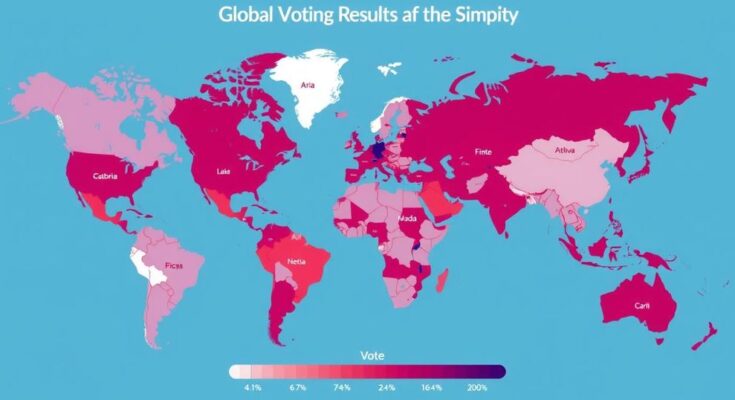In 2024, over 60 countries voted, engaging nearly half the globe’s population in a historic democratic exercise. Economic issues overshadowed pressing concerns like climate change, leading to shifts in political power in several countries. Incumbents, including President Biden and PM Modi, faced significant challenges due to voter dissatisfaction. The upcoming years may witness further ramifications from these election outcomes, particularly regarding the international political landscape and the state of global democracy.
The year 2024 witnessed a historic global electoral participation, as over 60 countries encompassing nearly half of the world’s population chose their leaders. This remarkable moment in democratic evolution, however, revealed the persistent challenges facing voters, who often prioritized immediate self-interests over collective well-being. Fear and economic concerns dominated electoral outcomes, overshadowing pressing issues such as climate change.
In industrialized nations like the United Kingdom, immediate economic worries overrode long-term considerations, contributing to a decisive Labour Party victory against the Conservatives. Similarly, in the United States, President Joe Biden faced voter backlash despite reducing inflation. The electorate’s demand for change directed support towards Donald Trump, demonstrating a trend of voting based on economic distress.
Notably, the 2024 elections revealed a shift toward populism across various regions. In India, Prime Minister Narendra Modi’s party experienced a decline in support, while in South Africa, the ruling party lost its majority for the first time. Other countries saw different dynamics; Mexico’s governing party gained ground, contrasting with trends in Europe where populists on both ends of the spectrum flourished.
Elections persisted throughout the year, culminating in Germany where Chancellor Olaf Scholz’s coalition faced a no-confidence vote amid economic struggles, precipitating early elections for 2025. This reflects a growing global embrace of democracy, often remembered as a privilege inaccessible to millions just a century ago.
In France, President Emmanuel Macron’s reaction to a parliamentary election following populist gains illustrates how established leaders grapple with changing tides. Macron’s decision to call for elections after witnessing a surge in populist support indicated the precariousness of political stability in the face of economic dissatisfaction. Despite receiving upper hand support during D-Day commemorations, both Macron and Modi struggled as voters expressed discontent with their economic records.
Conversely, Putin’s substantial electoral victory in Russia highlights the stark divergence from true democratic practices, showcasing a regime where dissent is met with severe reprisal, effectively manipulating the electoral process.
2024’s electoral landscape appears to forecast potential power dynamics moving forward, particularly regarding the relationship between Trump and Putin amid ongoing international crises. The anticipated shift in US foreign policy may have far-reaching implications for global stability, particularly in Ukraine, which remains unable to conduct elections due to ongoing aggression from Russia. As the global landscape evolves, the reflections on democratic practices across nations underscore the interconnectedness of political choices.
The unintended consequences of election outcomes serve as a reminder of the broader implications of each nation’s electoral processes. The nascent return to democratic voting in countries such as Syria represents a chance for renewed hope in governance, emphasizing the importance of maintaining democratic principles worldwide, despite the existing challenges. Each election demonstrates the resilience and vulnerabilities of democracy itself, affirming its vital role in shaping global narratives and futures.
The article discusses the significant electoral participation in 2024, highlighting how nearly half of the world’s population engaged in the democratic process, particularly across 60 countries. It explores the political landscape shaped by economic challenges, fear, and populism that affected the outcomes of various elections. By juxtaposing different nations’ experiences, the article emphasizes the complexities and ramifications of democratic engagement and voter sentiment in contemporary governance.
In conclusion, the electoral events of 2024 reflect a dynamic and evolving landscape of global democracy, where immediate economic concerns and populist sentiments disproportionately influenced voter behavior. Despite remarkable participation rates, many outcomes reveal an electorate still grappling with deeper issues such as trust in government and long-term planning versus immediate self-interest. As countries navigate these challenges, the significance of democratic choice remains paramount, offering lessons for the future amid shifting political tides.
Original Source: edition.cnn.com




